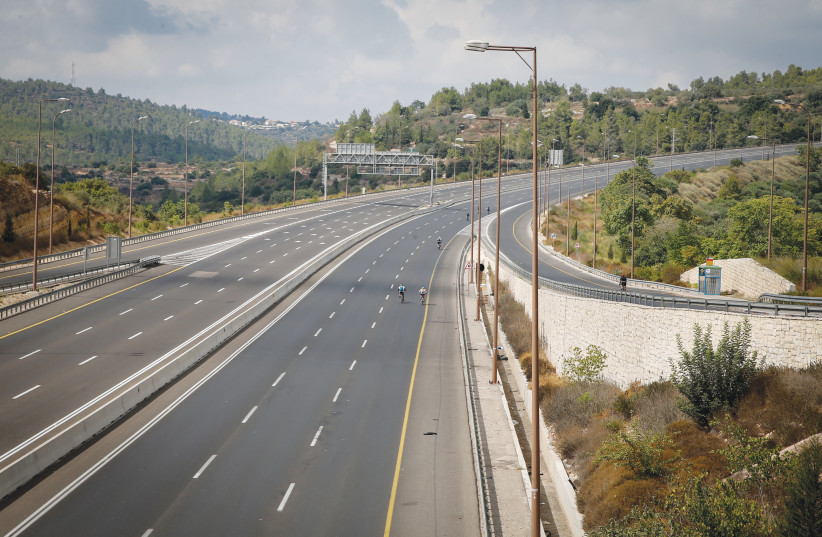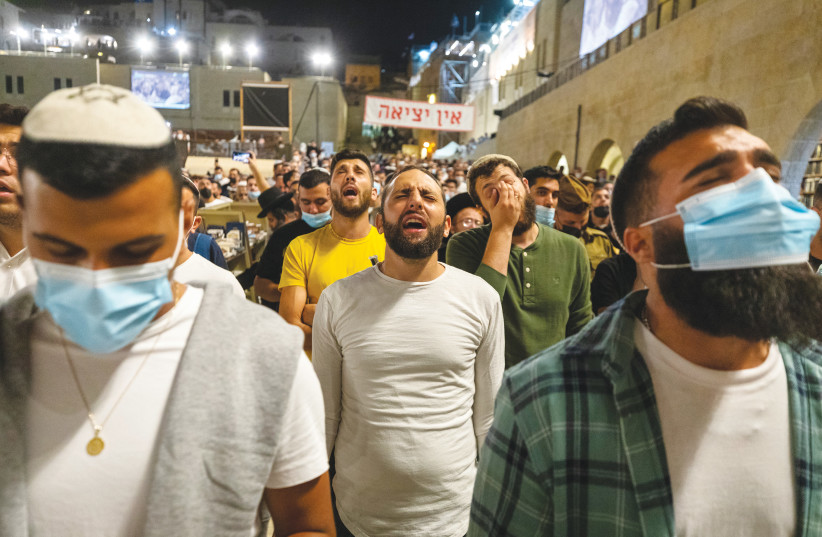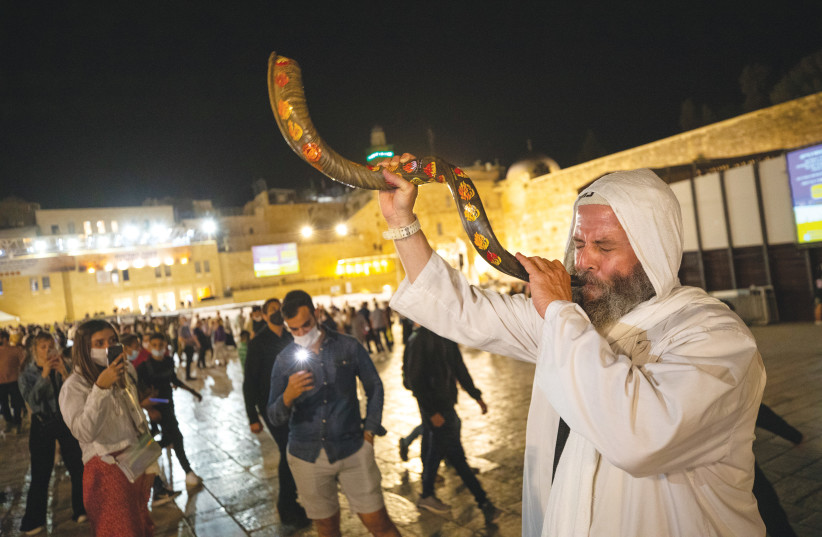Yom Kippur is a bubble in time; the holiest day of the year; the most meaningful day of all.
It is a special, unique, untouched envelope of time, in which the din of urgency gives way to the essential and the profound.
It is an opportunity to set aside the explanations and justifications, the “how much” and the “how,” and to concentrate on the “why” and the “where to.”
The uniqueness of Yom Kippur is that it introduces into our everyday routine an external perspective on that routine. We step off the beaten path, as it were, and examine the path we have already taken, and the one we intend to take. There is a miracle of experience here: on a fixed date of the Jewish calendar we manage, year after year, to enter a space tailored for self-reflection.
But Yom Kippur is not just a personal day when every Jew reckons with him- or herself in the presence of God. It is also a public day that invites us to contemplate various aspects of our collective life, as Israelis. I would like to point out four of these public aspects for which Yom Kippur should serve as the final stop of an annual journey – a time of summing-up and reflection, as well as the starting point for a new year-long journey, as a group:

A. The public realm – between New York and Tel Aviv
Since we gathered together into our homeland and became a majority in Eretz Israel, the Jewish Yom Kippur has also become an Israeli Yom Kippur. The experience of the day for a Jew in New York or London is incomparable to the experience in Jerusalem or Tel Aviv. It is a singular phenomenon: the cars are silenced, the roadways empty; commerce, industry and nonessential services come to a halt. And above all, it is a day when the giant flywheel of our lives – the media – stops turning.
The existential hustle and bustle is replaced by an existential silence. This is an amazing occurrence that dramatically expresses a very broad social consensus, with almost no element of coercion. Everyone is eager to respect the tradition: some for religious reasons, some for national reasons, some for cultural reasons.
How fascinating: Israeli society is mired in an ongoing crisis of disagreement on matters of religion and state – allegations of religious coercion from here and of liberal imperialism from there; yet Yom Kippur is the very heart of Israeli consensus.
It is an experience of quiet harmony, of shared identity – the eye of the storm in a simmering culture war that is approaching a boiling point. We often grapple with the question of what it means to be a “Jewish state.” On Yom Kippur, the Israeli body politic gives an unequivocal answer. A Jewish state is one where the public sphere is shaped, among other things, by a trove of Jewish content.
Now that we possess Jewish sovereignty, Judaism is not just a private-personal matter, or a family or even a communal matter. Judaism is a way of life that is expressed in the public realm holistically. Jewish identity is an entire world whose public character was suppressed by the golah, the exile. The State of Israel arose and revived that world, albeit hesitantly. Yom Kippur is, therefore, also a day when we identify ourselves as Jews in public.
B. The norms – between guilt and responsibility
The State of Israel is judicializing itself. The judicial system is a major player in the current Israeli drama – its hands are in everything, and everything is in its hands. Our present overreliance on the judiciary reflects the fact that the day-to-day arenas designed for settling disagreements – the marketplace of ideas, civil society, the political system – are failing to provide solutions to the great dilemmas of our national life, and so the legal system is required to address and decide on societal disputes.
But there is another way to handle the gnawing Israeli social discord. Yom Kippur, the Jewish day of judgement, embodies this alternative. In contrast to customary law, in which deliberations are meant to decide between two poles – “guilt” or “innocence” – Yom Kippur presents a third option: neither guilt nor innocence but “responsibility.”
The worshiper who stands before God does not assume that he or she is entitled to a personal presumption of innocence, quite the contrary: on the Day of Atonement, he or she confesses with a comprehensive, harsh, unconditional statement: Ashamnu – we have acted wickedly; Shihatnu – we have dealt corruptly; Tiavnu – we have committed abomination; Ta’inu – we have gone astray; Titanu– we have led others astray.
It is clear that from a legal perspective these are false accusations. Did I really commit the long list of transgressions that appear in alphabetical order in the Vidui (prayer of confession)? According to legal logic, if I am not guilty, then I am innocent; if so, why should I confess?
The fact is that Yom Kippur deals with something deeper than the imposition of guilt; what it is concerned with is responsibility. On Yom Kippur one conducts his or her own trial, between himself and herself, before God. It should be an internal, intense and honest accounting. We submit the findings about our own responsibility to God with faith, humility and hope.
There is, thus, a fundamental and essential difference between liberal Israeli law, which deals with guilt and innocence, and traditional Jewish law, which deals with responsibility independent of guilt.
And from the private to the public: It is no coincidence that the Vidui is said in the first-person plural: Ashamnu, bagadnu, gazalnu (“We have transgressed, we have betrayed, we have robbed”). In the Vidui, the “I” takes responsibility not merely for himself as an individual, but for the entirety of his being, in whose context he is a part, a member, of an affiliation group.
The most striking Jewish innovation of today’s generation is that our affiliation group is organized within the framework of a Jewish nation-state. As a result, the discourse of responsibility that characterizes Jewish law and Yom Kippur must extend into that sovereign space. Instead of inter-tribal wrangling, in the shadow of the law, our Judaism proposes that we embrace a discourse of conscientious responsibility. The current judicialization and its accompanying background noise are negating the opportunity – for individuals and for society as a whole – to act in accordance with the inner voice, the voice of responsibility.

C. Society – between exclusion and acceptance
What should we take responsibility for, as a nation, during these Days of Awe? Where is the acknowledgment of sin and repentance required of the entire Israeli society?
At the top of the list, it seems to me, is the faltering relations between the different groups in our society. A disgraceful custom has proliferated among us: periodically, one particular group – whether “the haredim,” “the leftists,” “the settlers” – will be brought to the public chopping block, and the rest of society hurls attacks of invective and ridicule at that group, stereotyping it on the basis of its most extreme elements.
The collective repentance needed is for the mainstream of each group to mobilize against the discourse of hate. Imagine that on Erev Yom Kippur the authentic leadership of each group were to publicly denounce the marginal elements within it. Imagine that in Bnei Brak thousands of ultra-Orthodox took to the streets to protest their own zealots and the erasure of women; that in Ofra, a conference of religious-Zionist rabbis issued a halachic ruling against tag mehir (“price-tag”) vengeance. Picture a meeting in the Knesset where the heads of all of the Zionist political parties decry the demonization of the Left; imagine a conference of cultural creators and artists of the Left, at the Tel Aviv Cinematheque, where they take turns adding their signatures to Israel’s Declaration of Independence, while reaffirming the state’s Jewishness and acquitting it of the charge of colonialism.
All these scenarios, and others, would constitute an appropriate collective, national effort at repentance during the Days of Awe.
Collective repentance is badly needed these days when the heated political debate pushes us away from one another. Nevertheless, most Israelis value the fact that we have, all of us, a shared past that makes us brothers. They understand that in order for us to have a shared future, we must earnestly and responsibly tend to the present and solidify the feeling of brotherhood among us. The collective repentance required is not a luxury, but a necessity of national resilience.

D. Religion – between coercion and meaning
Repentance is not only a matter of one’s relationship with his Creator (bein adam la’Makom) but also of one’s relationships with other people (bein adam le’havero). Here, too, it is necessary to upgrade repentance from the personal dimension to the public, national dimension. I am referring to the place of religion in Israeli public life.
In the past, in the Diaspora, religion was the unifying factor for all Jews. Previous generations, across the globe, managed to maintain their identity as Jews through religious commitment, which was a common denominator for Jews everywhere.
Today, in Israel, it is unfortunate and painful to say that religion is a divisive factor between Jews. Many struggles are waged in the name of religion, and against it. The relationship between religion and state in Israel is one of the worst in the West.
At bottom, I believe that the responsibility for renewing the important and proper place of religion in our national life should lie with those who speak in religion’s name – rabbis and religious leaders. The demand placed upon them should be twofold: First – sur me’ra – turn away from evil. They should oppose religious coercion of any kind. Second – aseh tov – do good. They must offer relevant religious meaning to the questions on the national agenda.
We need religious leaders who dare to face the spiritual and moral aspects of sovereign life. Were the prophets Amos, Jeremiah and Isaiah living among us today, they would intensively engage with these questions by virtue of their religious-spiritual authority.
For example: What is the religion’s position with respect to the various parts of the Universal Declaration of Human Rights – including civil rights, such as equality and freedom of expression, and social rights, such as the right to housing, healthcare and reasonable education? In Israel, as a Jewish state, should refugees be treated differently than in other Western countries? And what does Judaism tell us about the poverty line and the collective responsibility for the disadvantaged living among us?
I regret to say that Israel’s religious leadership, for the most part, fails to address these questions, which constitute our real challenge as a nation. Religion can and should serve as a corrective force in the Israeli public realm. A religious response to the national challenge is required. That is what the Days of Awe are for.
The writer is president of the Jewish People Policy Institute and a professor of law at Bar-Ilan University. •
